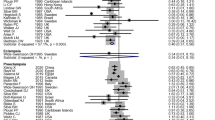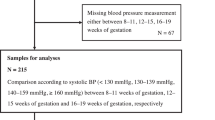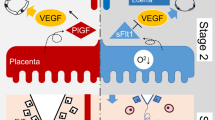Abstract
Objective:
We assessed whether requiring >1 medication for blood pressure control is associated with adverse pregnancy outcomes.
Study Design:
Retrospective cohort of 974 singletons with chronic hypertension at a tertiary care center. Subjects on >1 antihypertensive agent were compared with those on one agent <20 weeks gestational age with results stratified by average blood pressure (<140/90 and ⩾140/90 mm Hg) from prenatal visits. The primary maternal outcome was preeclampsia; the primary neonatal outcome was small for gestational age (<10th percentile).
Result:
Among women with blood pressure ⩾140/90 mm Hg, women on multiple agents had the greatest risk of preeclampsia, severe preeclampsia, antenatal admissions to rule out preeclampsia, preterm birth <35 weeks and composite neonatal adverse outcomes.
Conclusion:
Compared with use of a single agent when blood pressure is ⩾140/90 mm Hg, use of multiple agents increases adverse risks, while no such finding exists when blood pressure is controlled below 140/90 mm Hg.
This is a preview of subscription content, access via your institution
Access options
Subscribe to this journal
Receive 12 print issues and online access
$259.00 per year
only $21.58 per issue
Buy this article
- Purchase on Springer Link
- Instant access to full article PDF
Prices may be subject to local taxes which are calculated during checkout

Similar content being viewed by others
References
Vanek M, Sheiner E, Levy A, Mazor M . Chronic hypertension and the risk for adverse pregnancy outcome after superimposed preeclampsia. Int J Gynaecol Obstet 2004; 86: 7–11.
Sibai BM . Chronic hypertension in pregnancy. Obstet Gynecol 2002; 100: 369–377.
Sibai BM, Abdella TN, Anderson GD . Pregancy outcomes in 211 patients with mild chronic hypertension. Obstet Gynecol 1983; 61: 571–576.
Sibai BM, Lindheimer M, Hauth J, Caritis S, VanDorsten P, Klebanoff M et al. Risk factors for preeclampsia, abruptio placentae, and adverse neonatal outcomes among women with chronic hypertension. N Eng J Med 1998; 339: 667–671.
Rey E, Couturier A . The prognosis of pregnancy in women with chronic hypertension. Am J Obstet Gynecol 1994; 171: 410–416.
McCowan LM, Buist RG, North RA, Gamble G . Perinatal morbidity in chronic hypertension. Br J Obstet Gynecol 1996; 103: 123–129.
Report of the National High Blood Pressure Education Program Working Group on High Blood Pressure in Pregnancy. Am J Obstet Gynceol 2000; 183: S1–S22.
American Congress of Obstetricians and Gynecologists Task Force on Hypertension in Pregnancy. Hypertension in Pregnancy. American Congress of Obstetricians and Gynecologists: Washington, DC, USA, 2013.
The American College of Obstetricians and Gynecologists Committee on Obstetrics Practice, The Society for Maternal-Fetal Medicine. Medically Indicated Late-Preterm and Early-Term Deliveries. Committee Opinion Number 560, April 2013.
Magee LA, von Dadelszen P, Rey E, Ross S, Asztalos E, Murphy KE et al. Less-tight versus tight control of hypertension in pregnancy. N Engl J Med. 2015; 372 (5): 407–417.
Ankumah NA, Cantu J, Jauk V, Biggio J, Hauth J, Andrews W et al. Risk of adverse pregnancy outcomes in women with mild chronic hypertension before 20 weeks of gestation. Obstet Gynecol. 2014; 123 (5): 966–972.
Spong C . Defining “Term” pregnancy: recommendations from the defining “Term” pregnancy workgroup. JAMA 2013; 309 (23): 2445–2446.
Ray JG, Vermeulen MJ, Burrows EA, Burrows RF . Use of antihypertensive medications in pregnancy and the risk of adverse perinatal outcomes: McMaster Outcome Study of Hypertension In Pregnancy 2 (MOS HIP 2. BMC Pregnancy Childbirth 2001; 1: 6.
Su C-Y, Lin H-C, Cheng H-C, AM-F Yen, Chen Y-H et al. Pregnancy outcomes of anti-hypertensives for women with chronic hypertension: a population-based study. PLoS One 2013; 8 (2): e53844.
Acknowledgements
LMH is supported by K12HD001258 (PI WW Andrews, NICHD), which partially supports this work.
Author information
Authors and Affiliations
Corresponding author
Ethics declarations
Competing interests
The authors declare no conflict of interest.
Rights and permissions
About this article
Cite this article
Allen, S., Tita, A., Anderson, S. et al. Is use of multiple antihypertensive agents to achieve blood pressure control associated with adverse pregnancy outcomes?. J Perinatol 37, 340–344 (2017). https://doi.org/10.1038/jp.2016.247
Received:
Revised:
Accepted:
Published:
Issue Date:
DOI: https://doi.org/10.1038/jp.2016.247



